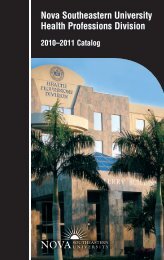Student Handbook - College of Pharmacy - Nova Southeastern ...
Student Handbook - College of Pharmacy - Nova Southeastern ...
Student Handbook - College of Pharmacy - Nova Southeastern ...
You also want an ePaper? Increase the reach of your titles
YUMPU automatically turns print PDFs into web optimized ePapers that Google loves.
Grievance Procedures for Nonacademic Disputes<br />
This process should be followed for all nonacademic grievances <strong>of</strong> policies / procedures that are not<br />
governed by a specific academic center, program, college, or school. Academic grievances should be<br />
referred to the student’s academic center. The purpose <strong>of</strong> these grievance procedures is to promote<br />
the orderly resolution <strong>of</strong> problems arising out <strong>of</strong> a student complaint concerning a policy, procedure,<br />
or administrative action <strong>of</strong> <strong>Nova</strong> <strong>Southeastern</strong> University. Grievances can <strong>of</strong>ten be adversarial,<br />
unpleasant, and unsatisfying, so we recommend that students discuss problems before resorting to the<br />
formal grievance steps. When formal grievance steps are perceived as necessary, students have a right<br />
to a fair process and hearing without retribution.<br />
1. First, the student should attempt to resolve an issue in dispute at the level at which the dispute<br />
occurred. This attempt must be in writing (i.e., email, regular mail, or fax). The student may<br />
wish to use certified mail to verify receipt <strong>of</strong> the correspondence. In the correspondence, the<br />
student must present a rationale for his or her position based on factual information.<br />
2. The student will receive a reply, in writing, which addresses the complaint.<br />
3. If the reply is not acceptable, the student is encouraged to submit the complaint in writing to<br />
the associate dean <strong>of</strong> student affairs. The associate dean <strong>of</strong> student affairs will attempt to resolve<br />
the dispute.<br />
4. If the associate dean is unable to resolve the dispute, he or she will notify the student and the<br />
dean <strong>of</strong> student affairs in writing.<br />
5. The student may then appeal in writing to the dean <strong>of</strong> student affairs.<br />
6. The dean will investigate and review the findings, and will notify the student in writing <strong>of</strong> his or<br />
her decision.<br />
7. The dean’s decision is final and binding and cannot be appealed.<br />
Guests<br />
<strong>Student</strong>s are welcome to bring guests to the campus, but must assume responsibility for the conduct<br />
<strong>of</strong> their guests and must accompany them at all times. If a guest is asked to leave a specific area <strong>of</strong><br />
campus, it is the responsibility <strong>of</strong> the student host to cooperate with the university <strong>of</strong>ficial making<br />
the request. The university reserves the right to exclude all guests from any area on campus in times <strong>of</strong><br />
impending or actual crises or emergencies, such as hurricanes, campus disruptions, or bomb threats, and<br />
to exclude any guest(s) from any area <strong>of</strong> the campus for any reason the university deems appropriate.<br />
Health Policies<br />
Communicable Diseases Guidelines<br />
It is the intent <strong>of</strong> the university to protect students from communicable diseases that pose reasonable<br />
risk <strong>of</strong> harm to members <strong>of</strong> the university community. It is also the intent <strong>of</strong> the university to protect<br />
the rights <strong>of</strong> those infected with a communicable disease. <strong>Student</strong>s who do become infected with<br />
a communicable disease must report the contracting <strong>of</strong> the disease to their program dean and the<br />
associate dean <strong>of</strong> student affairs and are subject to the guidelines listed below. The university will be<br />
flexible in its response to incidents <strong>of</strong> communicable diseases, evaluating each occurrence in light <strong>of</strong><br />
this policy and current available medical information.<br />
• NSU will make available to the university community detailed information concerning the<br />
transmissibility <strong>of</strong> communicable diseases and precautions that can be taken to prevent the spread<br />
<strong>of</strong> various communicable diseases.<br />
46 NSU <strong>Student</strong> <strong>Handbook</strong> 2011–2012




